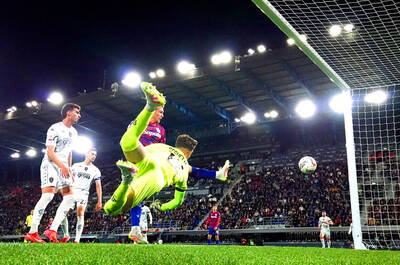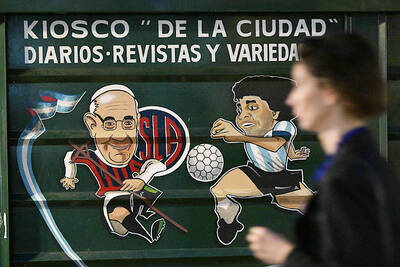Chung Yi-min would go to a baseball game almost every month and watch many more on television until four or five years ago, when the 36-year-old fan started getting fed up with the nation’s most popular sport.
“If they don’t catch balls I get suspicious because these are professional players,” said Chung, who works as an event planner and has watched baseball since childhood. “Everyone will think that the game result isn’t the actual result.”
Chung now prefers televised US Major League Baseball to local games because of illegal betting, which has cost the nation’s 20-year-old league a chunk of its fan base, taking income away from the sport’s development and lowering the national team’s odds of international championships.
Taiwan’s Criminal Investigation Bureau logged 102 illegal baseball betting cases involving 222 people last year and have tapped 20 cases covering 32 people so far this year.
Justice ministry spokesman Luo Chi-wang said that punters could keep their names secret from betting ring operators.
The Cabinet has said it will take a swing at betting this year, while celebrities and President Ma Ying-jeou (馬英九) have attended games to stimulate audience interest.
“Local prosecutors will keep looking into this matter,” Luo said. “Of course there’s a mafia connection but we haven’t deeply analyzed it. We’re not saying it still exists or whether it has changed.”
Taiwan’s four professional teams have lost 45 percent of their stadium attendance over the past five years, cutting attendance to about 573,000 per year, league statistics show.
Television viewership had sunk by more than half over the same period largely due to public suspicions about betting, a team president said.
Taiwan went out early from the World Baseball Classic last month and won only two of seven games at last year’s Beijing Olympics.
“If there’s no one watching, how can you develop a team?” said Richard Lin, secretary-general of the Chinese Taipei Baseball Association.
A decline in the number of baseball fans reduces box office income, drying up training funds and pressuring companies to consider dropping team sponsorships.
The specter of betting and threats against players also discourage students from taking up the sport in school.
“If no one watches, that will affect the images of companies that sponsor teams and they will question whether they want to continue the sponsorships,” said Jason Lin, president of the Uni-President Lions team. “And parents won’t send their children to play ball.”
A players’ association said last month that up to 100 members would sign more than 10 percent of their salaries to a local bank for their retirement. If a player was convicted of intentional poor play, the bank would donate the money to baseball development.
“False play has been such a problem in the past, so we need to increase self-discipline,” said Lions pitcher Pan Wei-lun, adding that he had never been approached by betting rings.
Most players were in fair territory but “a few” still played poorly due to mafia threats or the money received for cooperating with bettors, league commissioner Chao Shou-po said.
“Let’s not make the wrong friends or go to the wrong places,” Chao told players at a ceremony with the bank.

Bologna on Thursday advanced past Empoli to reach their first Coppa Italia final in more than half a century. Thijs Dallinga’s 87th-minute header earned Bologna a 2-1 win and his side advanced 5-1 on aggregate. Giovanni Fabbian opened the scoring for Bologna with a header seven minutes in. Then Viktor Kovalenko equalized for Empoli in the 30th minute by turning in a rebound to finish off a counterattack. Bologna won the first leg 3-0. In the May 14 final in Rome, Bologna are to face AC Milan, who eliminated city rivals Inter 4-1 on aggregate following a 3-0 win on Wednesday. Bologna last reached the

If the Wild finally break through and win their first playoff series in a decade, Minnesota’s top line likely will be the reason. They were all over the Golden Knights through the first two games of their NHL Western Conference quarter-finals series, which was 1-1 going back to Minnesota for Game 3 today. The Wild tied the series with a 5-2 win on Tuesday. Matt Boldy had three goals and an assist in the first two games, while Kirill Kaprizov produced two goals and three assists. Joel Eriksson Ek, who centers the line, has yet to get on the scoresheet. “I think the biggest

From a commemorative jersey to a stadium in his name, Argentine soccer organizers are planning a slew of tributes to their late “Captain” Pope Francis, eulogized as the ultimate team player. Tributes to the Argentine pontiff, a lifelong lover of the game, who died on Monday at the age of 88, have been peppered with soccer metaphors in his homeland. “Francisco. What a player,” the Argentine Football Federation (AFA) said, describing the first pope from Latin America and the southern hemisphere as a generational talent who “never hogged the ball” and who showed the world “the importance of having an Argentine captain,

Noelvi Marte on Sunday had seven RBIs and hit his first career grand slam with a drive off infielder Jorge Mateo, while Austin Wynn had a career-high six RBIs as the Cincinnati Reds scored their most runs in 26 years in a 24-2 rout of the Baltimore Orioles. Marte finished with five hits, including his eighth-inning homer off Mateo. Wynn hit a three-run homer in the ninth off catcher Gary Sanchez. Cincinnati scored its most runs since a 24-12 win against the Colorado Rockies on May 19, 1999, and finished with 25 hits. Baltimore allowed its most runs since a 30-3 loss to